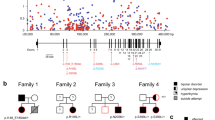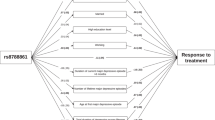Abstract
The periodically hyperactive hypothalamic-pituitary-adrenal (HPA) axis in bipolar affective disorders, as well as the reported changes in the binding characteristics of the glucocorticoid receptor (GR), suggest the possible involvement of the GR in the aetiopathology of this disease. This was investigated by screening the coding sequences of both GR isoforms, GRα and GRβ, for the presence of mutations. As a genetic predisposition has been implicated, we included in this study bipolar patients who were siblings. By RT-PCR of peripheral blood mononuclear cells from patients suffering from bipolar illness, using primers spanning the whole length of the GRα and GRβ coding region and subsequent agarose gel electrophoresis, heteroduplex and sequence analyses, no GR mutations could be detected. Since glucocorticoid receptor activity can be modulated by agents other than the respective ligand (eg by growth factors, cytokines and stress signals), our results favor derangements in the modulation of GR activity by such agents and not in the primary structure of the receptor as aetiopathologic factors of bipolar disease.
This is a preview of subscription content, access via your institution
Access options
Subscribe to this journal
Receive 12 print issues and online access
$259.00 per year
only $21.58 per issue
Buy this article
- Purchase on Springer Link
- Instant access to full article PDF
Prices may be subject to local taxes which are calculated during checkout



Similar content being viewed by others

References
Detera-Wadleigh SD, Badner JA, Goldin LR, Berrettini WH, Sanders AR, Rollins DY et al. Affected-sib-pair analyses reveal support of prior evidence for a susceptibility locus for bipolar disorder on 21q Am J Hum Genet 1996; 58: 1279–1285
Nothen MM, Cochon N, Craddock N, Albus M, Maier W, Lichtermann D et al. Linkage studies of bipolar disorder to chromosome 18 markers Biol Psychiatry 1996; 39: 501–508
MacKinnon DF, Jamison KR, DePaulo JR . Genetics of manic depressive illness Annu Rev Neurosci 1997; 20: 355–373
Musselman DL, Nemeroff CB . Adrenal function in major depression The Endocrinologist 1995; 5: 91–96
Van Praag HM . Faulty cortisol/serotonin interplay. Psychopathological and biological characterisation of a new, hypothetical depression subtype (SeCA depression) Psychiatr Res 1996; 65: 143–157
Mann JJ, Malone KM . Cerebrospinal fluid amines and higher-lethality suicide attempts in depressed inpatients Biol Psychiatry 1997; 41: 162–171
Deuschle M, Schweiger U, Weber B, Gotthardt U, Korner A, Schmider J et al. Diurnal activity and pulsatility of the hypothalamus-pituitary-adrenal system in male depressed patients and healthy controls J Clin Endocrinol Metab 1997; 82: 234–238
Lowy MT, Reder AT, Antel JP, Meltzer HY . Glucocorticoid resistance in depression: the dexamethasone suppression test and lymphocyte sensitivity to dexamethasone Am J Psychiatry 1984; 141: 1365–1370
Young EA, Haskett RF, Weinberg VM, Watson SJ, Akie H . Loss of glucocorticoid fast feedback in depression Arch Gen Psychiatry 1991; 48: 693–699
Barden N, Reul JMH, Holsboer F . Do antidepressants stabilize mood through actions on the hypothalamic-pituitary-adrenocortical system? Trends Neurosci 1995; 18: 6–11
Murphy BEP . Antiglucocorticoid therapies in major depression: a review Psychoneuroendocrinology 1997; 22: 5125–5132
Pariante CM, Nemeroff CB, Miller AH . Glucocorticoid receptors in depression Israel Med Sci 1995; 31: 705–712
Schlechte JA, Sherman B . Lymphocyte glucocorticoid receptor binding in depressed patients with hypercortisolaemia Psychoneuroendocrinology 1985; 10: 469–474
Wassef A, Smith EM, Rose RM, Gardner R, Nguyen H, Meyer WJ . Mononuclear leucocyte glucocorticoid receptor binding characteristics and down regulation in major depression Psychoneuroendocrinology 1990; 15: 59–68
Gormley GJ, Lowy MT, Reder AT, Hospelhom VD, Antel JP, Meltzer HY . Glucocorticoid receptors in depression: relationship to the dexamethasone suppression test Am J Psychiatry 1985; 142: 1278–1284
Whalley CJ, Borthwick N, Copolov D, Dick H, Christie JE, Fink G . Glucocorticoid receptors and depression Br Med J 1986; 292: 859–861
Rupprecht R, Kornhuber J, Wodarz N, Lugauer J, Göbel C, Riederer P et al. Lymphocyte glucocorticoid receptor binding during depression and after clinical recovery J Affect Dis 1991; 22: 31–35
Hollenberg SM, Weinberger C, Ong ES, Cerelli G, Oro A, Lebo R et al. Primary structure and expression of a functional human glucocorticoid receptor cDNA Nature 1985; 318: 635–641
Encio IJ, Detera-Wadleigh SD . The genomic structure of the human glucocorticoid receptor J Biol Chem 1991; 266: 7182–7188
Nobukumi Y, Smith CL, Hager GL, Detera-Wadleigh SD . Characterization of the human glucocorticoid receptor promoter Biochemistry 1995; 34: 8207–82014
Tsai MJ, O'Malley BW . Molecular mechanisms of action of steroid/thyroid receptor super-family members Ann Rev Biochem 1994; 63: 451–486
Beato M, Herrlich P, Schutz G . Steroid hormone receptors: many actors in search of a plot Cell 1995; 83: 851–857
Gottlicher M, Heck S, Herrlich P . Transcriptional cross-talk, the second mode of steroid hormone receptor action J Mol Med 1998; 76: 480–489
Krstic MD, Rogatsky I, Yamamoto KR, Garabedian MJ . Mitogen-activated and cyclin-dependent protein kinases selectively and differentially modulate transcriptional enhancement by the glucocorticoid receptor Mol Cell Biol 1997; 17: 3947–3954
Rogatsky I, Logan SK, Garabedian MJ . Antagonism of glucocorticoid receptor transcriptional activation by the c-Jun N-terminal kinase Proc Natl Acad Sci USA 1998; 95: 2050–2055
Hurley DM, Accili D, Stratakis CA, Karl M, Vamvakopoulos N, Rorer E et al. Point mutation causing a single amino acid substitution in the hormone binding domain of the glucocorticoid receptor in familiar glucocorticoid resistance J Clin Invest 1991; 87: 680–686
Chrousos GP, Castro M, Leung DYM, Webster E, Kino T, Bamberger C et al. Molecular mechanisms of glucocorticoid resistance/hypersensitivity potential clinical implications Am J Respir Crit Care Med 1996; 154: 539–544
Rogatsky I, Waase CLM, Carabedian MJ . Phosphorylation and inhibition of rat glucocorticoid receptor transcriptional activation by glycogen synthase kinase-3 (GSK-3) J Biol Chem 1998; 273: 14315–14321
Bamberger CM, Bamberger A, DeCastro M, Chrousos GP . Glucocorticoid receptor β, a potential endogenous inhibitor of glucocorticoid action in humans J Clin Invest 1995; 95: 2435–2441
Koper JW, Stolk RP, De Lange P, Huizenga NATM, Molijn GJ, Pols HAP et al. Lack of association between five polymorphisms in the human glucocorticoid receptor gene and glucocorticoid resistance Hum Genet 1997; 99: 663–668
Karl M, Lamberts SWJ, Detera-Wadleigh SD, Encio IJ, Stratakis CA, Hurley DM et al. Familial glucocorticoid resistance caused by a splice site deletion in the human glucocorticoid receptor gene J Clin Endocrinol Metab 1993; 76: 683–689
Shimizu S, Nomura K, Ujihara M, Sakamoto K, Shibata H, Suzuki T et al. An allele-specific abnormal transcript of the heat shock protein 70 gene in patients with major depression Biochem Biophys Res Commun 1996; 219: 745–752
Adcock IM . Steroid resistance in asthma: molecular mechanisms Am J Respir Crit Care Med 1996; 154: 558–561
Webster JC, Jewell CM, Bodwell JE, Munck A, Sar M, Cidlowski JA . Mouse glucocorticoid receptor phosphorylation status influences multiple functions of the receptor protein J Biol Chem 1997; 272: 9287–9293
Nuller JL, Ostroumova MN . Resistance to inhibiting effect of dexamethasone in patients with endogenous depression Acta Psychiatr Scand 1980; 61: 169–177
Acknowledgements
This work was supported by grant ‘PENED’ No. 70/3/2807 of the General Secretariat for Research and Technology of the Ministry of Development, Greece.
Author information
Authors and Affiliations
Corresponding author
Rights and permissions
About this article
Cite this article
Moutsatsou, P., Tsolakidou, A., Trikkas, G. et al. Glucocorticoid receptor alpha and beta isoforms are not mutated in bipolar affective disorder. Mol Psychiatry 5, 196–202 (2000). https://doi.org/10.1038/sj.mp.4000646
Received:
Revised:
Accepted:
Published:
Issue Date:
DOI: https://doi.org/10.1038/sj.mp.4000646
Keywords
This article is cited by
-
Glucocorticoid Receptor Gene-Based SNP Analysis in Patients with Recurrent Major Depression
Neuropsychopharmacology (2006)


